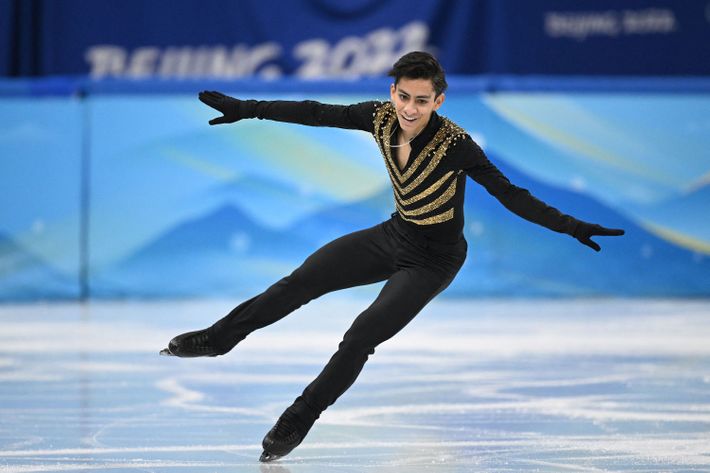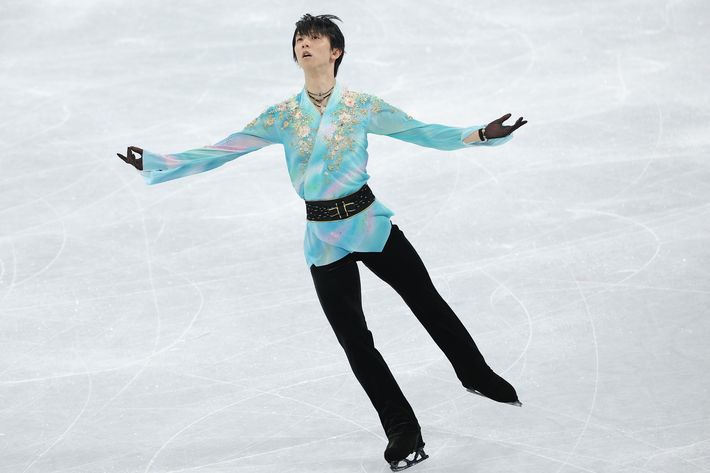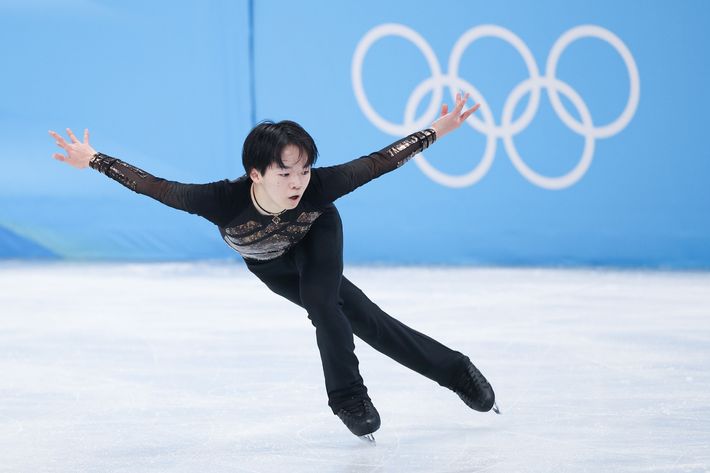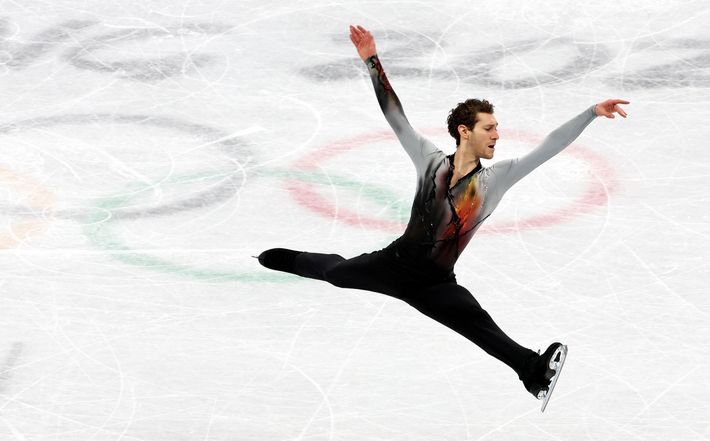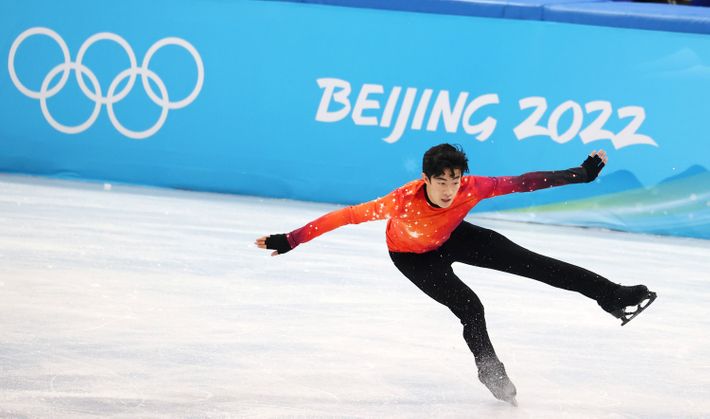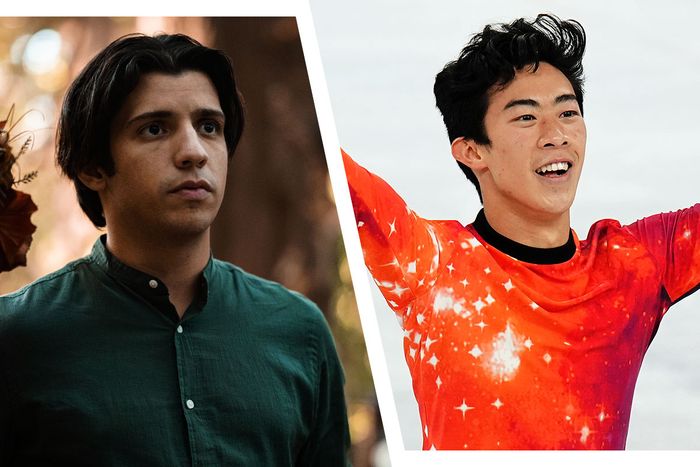
You may know Kevin Alves as moody teen Travis on Showtime’s breakout-hit maybe-cannibalism series Yellowjackets, but what you may not know him for comes in handy this week: being a former singles figure skater. After getting his mind blown watching a particularly incredible skater as a child (more on that soon), the Canada native represented Brazil on the ice as a teenager in the aughts and competed at multiple championships, eventually earning the distinction of being Brazil’s first men’s skater to compete internationally at the senior level in 2009. Thankfully, Alves accepted our request to hop on Zoom this week to offer up some expert commentary on the men’s singles programs at the 2022 Winter Olympics, which earned U.S. superstar Nathan Chen the gold medal — and have him dream up a Yellowjackets skating routine, obviously.
First of all, a Yellowjackets question: Where the hell is Javi? I have to ask.
You have to, yeah. Honestly, I don’t know. There were two different little scenes they pulled out and decided not to be in the finale. I think it was just to leave a little more options open for what could happen for season two. I am really excited to see what they’re planning because I was a big fan of that “Adam is Javi” fan theory. I really, really hope we find him, but he’s somewhere out there.
What was it like seeing all the fan theories and how closely viewers picked the show apart?
It’s the beauty of the week-to-week releases, in my opinion. It created a community of people that just wanted to figure out what was going on, so they meticulously went through every scene, every shot, and that’s been the most exciting part of watching the show come out. There’s such a big world of mystery around things in this show that allowing time for people to digest each episode and think about things just made it more exciting.
I’ve read some interviews you’ve done about your figure-skating career, and you mention Kurt Browning’s “Rag-Gidon-Time” program as the thing that made you want to be a skater. What was it about that performance that inspired you so much?
I was so young at the time. I was 6. Kurt Browning is once in a generation because he not only was able to be such a technical presence when he was competing, but there was just an artistry and a fun quality to him. I got to grow up around Kurt, and we worked together. It’s really true that the joy he shows on the ice is there off the ice. He embodies that love for what he does.
I just remember laughing hysterically watching “Rag-Gidon-Time.” I was in the stands, and people were probably looking at me like I was crazy. My mom was probably telling me to quiet down because I was just dying of laughter. Him and Sandra Bezic came together with this choreography that was just so funny in the most honest and youthful way. I was entranced by it, and I just knew I wanted to do something like that. I wanted that, and then I wanted to be an actor, and I knew that I wanted to do those two things for the rest of my life.
In terms of figure skating as a performance, how do you approach it? It feels like programs generally are either embodying an emotion or a story.
When I was skating, I wanted to look at it especially on the performance side: How does the choreography affect the story, and then how does the choreography affect the audience? Because they are two separate things. There is a performance and there is a story that needs to be told within it, and I think you need to service both. You need to service whatever the story is that you’re trying to tell, and that’s within the emotion and making sure you are being wholeheartedly honest with whatever that piece is. But then: Do not ignore your audience. Make sure your audience is a part of that performance because you’re on a stage. That’s why I think theater came a little more naturally to me when I was younger — I always tried to look at it from both of those angles.
You’ve talked before about how you were a pioneer for the figure-skating scene in Brazil, which reminded me of Donovan Carrillo, the Mexican skater who trains at a public skating rink in a mall. What did you think of his performance?
Donovan absolutely nailed the short program. He’s also really growing the sport in Mexico now. I know quite a few of the Mexican skaters I got to train with who are now coaches and really building there. I think we’re going to continue to see more and more countries like that grow and have more competitive international athletes.
NBC completely dropped the ball and skipped over Daniel Grassl, the Italian skater, during the free skate.
Daniel absolutely crushed it.
I’m mad I didn’t get to see it, but I heard it was great. I heard he scored his personal best?
He did. He scored 187. I believe he was fourth in the free skate. He landed quad lutz, quad flip, quad loop, triple Axel. He landed three quads, and then he landed triple Axel and then three other triples, so it was fantastic. He was pretty much dead clean.
Yuzuru Hanyu — my heart breaks for him because I’ve been watching him all year, and he’s so fantastic.
Yuzu is a rock star. Yuzu is one of those skaters who makes skating look cool, and the ease that he does everything — his career is so decorated. We’re talking two-time Olympic champion. And you know what? I’m really happy that he came back with a really solid free program. Can we just point out that that quad-Axel attempt was so close? If he decides to continue, I think there’s no question he’s landing it within a year, but it was heartbreaking to see him miss that jump in the short program.
He’s a class act — always will be. I’ve got to see him compete over the past ten, 15 years, and he’s never been anything but class.
Yuma Kagiyama is also insane. It’s been cool to see his rise.
His ability to rotate so fast with as much pop as he has reminds me of a skater from a few years back named Nobunari Oda, who had this ability to have these soft knees and really high pop. He has Nobunari’s pop with the quickness and rotation of Nathan and Yuzu. I expect to see him at the next two Olympics.
I was going to mention Ilia Malinin, who placed second at nationals but wasn’t picked for the Olympic team.
Yeah, Ilia is just super-talented.
He’s incredible!
Incredible. I don’t know if you’ve seen, but he’s now doing three different quad-quad combinations. He can do a quad toe–quad toe, quad toe–quad loop, and then I believe I saw a quad toe–half-loop–quad sal. So I can see a world where Ilia breaks the record next year with seven quads landed in a program.
Thoughts on Jason Brown? His skating is beautiful.
I’ve had the pleasure of knowing him on a personal level. He’s the nicest person you could ask for — the most supportive and upbeat skater you can think of. He’s such a great role model for everyone around him and will always be; he just has that exuding out of him, and his passion for the sport is what makes him such an amazing performer. He takes the time — and I’ve seen Jason train — to do every single thing he needs to make that program be detailed beyond anything. There’s no other program that can be more detailed than Jason’s.
Nathan Chen — I think any normal person who doesn’t know much about skating can watch his performance and think Wow, that was amazing. But as a skater, can you explain what it is about what he can do that I might not understand as well?
Nathan Chen and Raf Arutunian, his coach, together made sure that they were as efficient as humanly possible. Nathan’s been doing quads for a very long time. That’s given him the time to get so comfortable with them that now he does have that time to focus on other things and just let the quads be what they are; they’re just a part of the solo. He does that with more ease than anyone on the planet right now.
If you see Nathan’s quads, the technique is perfect. There’s no space between his arms. There’s no air coming through. His feet have a perfect point flex where the foot on top is pointed and the foot underneath is flexed, which is going to make him rotate and be ready for the landing. If you check out his impact when he hits the ground, he’s landing with his right elbow back and his knees staying together. If you slow it down, Nathan Chen is the skater who has picture-perfect technique. That helps him be able to focus on performance because he doesn’t have to worry as much about whether he’s going to land a quad or not, which makes a huge difference. I’m so happy for him overcoming the last Olympics to come now and lay down two really solid skates, and watch him just have so much fun for the last minute and a half of his program. I hope skating continues to have more of that — skaters who are pushing the boundaries in terms of performance and the types of performing we have in it — because Nathan does that.
Which other skaters were highlights for you? Who stood out?
The jump up of Daniel Grassl from Italy was a huge highlight for me. Coming from 12th to be fourth in the free skate, seventh overall, that’s a huge jump. Also I was really, really excited for Jin Boyang because he has had a rough couple of years in terms of competing and laying down programs, and to see him lay down two pretty solid programs and jump into the top ten at the Olympics after a couple rough years, that was like a personal victory. And Keegan Messing — one of the nicest guys in the sport — came and just did a really great job and represented the country with class.
Keegan is funny too. And Johnny Weir said something like “You rarely see flannel on ice” when he was skating, which made me laugh.
He’s a character. I met him on a Junior Grand Prix in Salt Lake way back, probably in 2009. And he’s himself — I love that. They said it really well in the broadcast where they were talking about how there’s skating for everyone in this group of skaters right now. They all really try and find their own style, their own look.
Circling back to Yellowjackets: Because music is a big part of the show, I’m going to force you on the spot to design a Yellowjackets program for men’s singles figure skating. What, from song to costume to choreography, does that look like?
I’m very biased because the song that I would choose is definitely “Vienna” by Ultravox because of the use that it’s had with both Natalie in episode three and Travis and Natalie in episode ten. I would definitely want to use that just because I think the passion behind that song is really heartbreaking and very cool. I think, from a costume perspective, I want some leather — some black leathers — in there. And I think choreography-wise, it’s going to be a heartbreak-love story. It’s definitely going to be a passion-filled program.
This interview has been edited and condensed.



